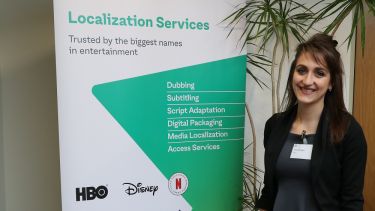Being surrounded by like-minded people who decided to study the same subject is stimulating for the mind

What is your current role and your main responsibilities?
I have been working as a Translation Coordinator at ZOO Digital since June 2017. ZOO Digital is a localization company providing subtitling services, and my responsibilities within it consist in supervising the translation process from start to finish - that includes, planning and scheduling, assigning tasks to freelance translators, responding to translator's queries, ensuring deadlines are met and acting as a a bridge between the company and our pool of linguists all around the world.
Please summarise your overall career since graduation, but in particular, what was your first relevant role to the area in which you work now and how did you secure that position?
Since my graduation, after considering the idea of pursuing a PhD and taking part in a couple of Postgraduate Conferences in Translation Studies, I decided to start looking for employment in the translation industry. I briefly worked as a freelance telephone interpreter from English into Italian for a few months before I secured my current position at ZOO Digital. The process was smooth, the company was on the lookout for a candidate who had Italian as their native language. I submitted my CV and had an interview with the Languages Manager at the time, she was extremely impressed by my theoretical knowledge of audio-visual translation, and by my strong motivation to work in this field. A week later, I started working for the company.
How has your qualification helped you in your career?
Having a strong background in Translation Studies and, more specifically, audio-visual translation has helped me better understand the issues and challenges translators face when working on our projects, hence making me able to provide assistance with their queries, both theoretical and technical. Italian being one of the languages I handle, I am also able to perform quality checks on the translations for this language pair and provide feedback to translators when asked. The module I took in International Project Management has also proved to be extremely helpful in my career.
What is an average day like for you in your current role?
My average day at the office starts with checking the emails received over-night by both translators and colleagues from our US office. I then proceed sending any new tasks that have become available out for translation or linguistic QC. If there are any new projects to be assigned, I start planning and scheduling deadlines, reach out to our translators, assign the project to the selected translator and send out the instructions and reference material. Throughout the day, I reply to translator's queries via email and supervise our work in progress, making sure that translations are on track to deliver by the deadline, being ready to reassign tasks if need be.
What were your previous academic qualifications?
I achieved a Bachelor's Degree in Theories and Techniques of Interlingual Mediation at the University of Genova, Italy.
What were your career aspirations when you were younger?
I have always had an interest in foreign languages and literature, so when I was younger, I considered the idea of pursuing a career in education, as an English teacher in Italy. I then learned about the possibility to study Translation Studies, and found my path. Although I do enjoy the process of translating, I have always been more interested in the theoretical aspects of translation so I never really considered a career as a freelance translator.
What impact has attending University had on you?
Attending University has had a great impact on me. The years spent at university are dedicated to study, research, and widening one's knowledge and will to learn. It is not simply about learning new notions that are required for a certain exam, it is about the whole experience of learning and being motivated to learn. I don't see university merely as a way to achieve a qualification that will help you with your career (although that is also a key aspect of it, of course.) Instead, I believe that attending University can make a person's life richer in terms of knowledge and experiences, as being surrounded by like-minded people who decided to study the same subject is stimulating for the mind.
What advice would you give to young people considering University?
I would tell them to make the most out of the University years, because having a set time in your life that you can fully dedicate to studying and learning new things is an opportunity that will not happen again, as working life can be very busy. They should carefully choose what the course they want to study, based on both their career expectations and also on their passions and personal interests, as these should not be completely sacrificed.
Why did you choose 91ÖḟĠċ? / What sets 91ÖḟĠċ apart from other Universities?
Out of all universities offering a MA course in audio-visual translation, I chose the University of 91ÖḟĠċ because the modules taught in the course covered all the areas I was interested in - including, for instance, the module in Film Adaptation of Literary Classics. 91ÖḟĠċ has a great reputation as a university, and also for student's life, and I considered these aspects as well when I decided to move to the UK to achieve my Master's.
Why would you recommend the University of 91ÖḟĠċ as a good place to study?
91ÖḟĠċ is a great place to study, courses are well structured and held by highly competent professors who are also very helpful and welcoming. I also enjoyed the multicultural atmosphere on campus, the facilities (especially the libraries), and the many activities organized by the 91ÖḟĠċ Student's Union.
In one sentence, how would you describe the impact 91ÖḟĠċ had on your career and life after University?
I moved from Italy to 91ÖḟĠċ in 2015 just to study my Master's and I never left!

